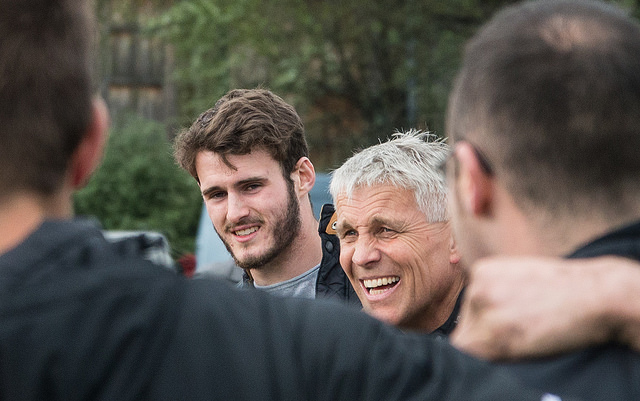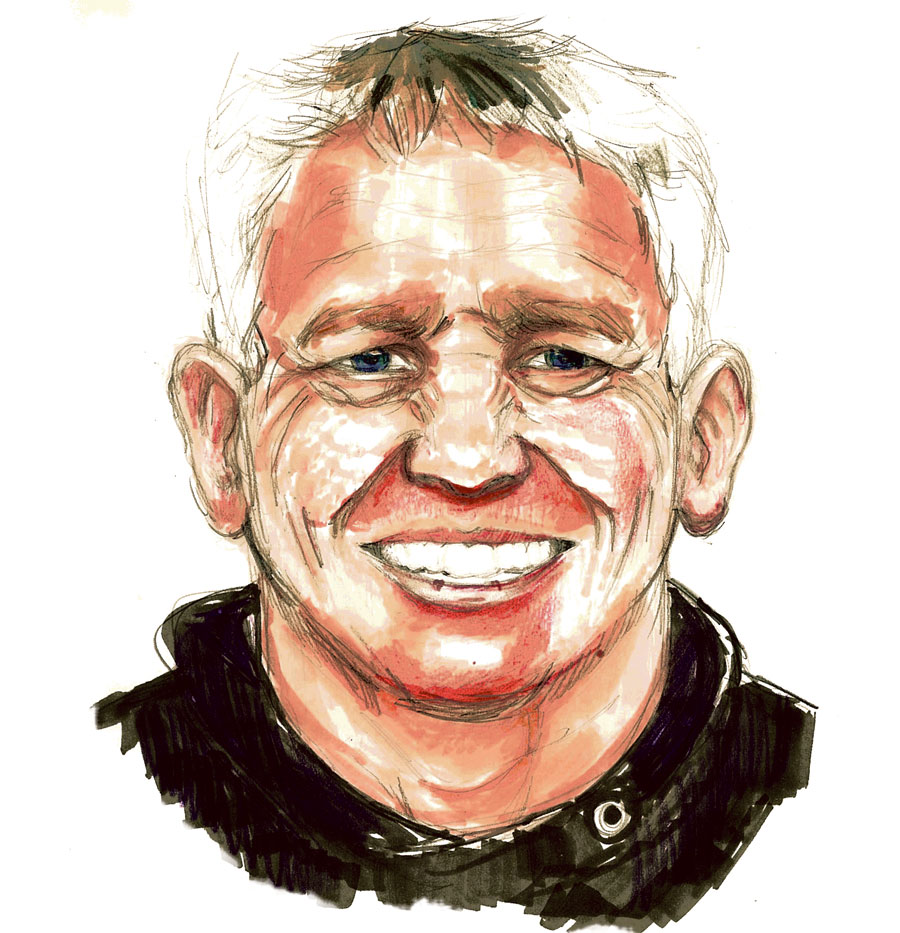Emails from Tony Smeeth usually arrive late at night. Texts sometimes as late as midnight. Even when they do arrive, replies are blunt or kept to a minimum. For Trinity’s Director of Rugby, there is simply not enough time in the day to stop and reply.
“Generally your best option is to go in and see him because he is running around the place like a mad thing all the time”, advises Trinity Women’s Rugby captain Molly Boyne.
When you do get him in person and talking, though, he barely stops. Especially when rugby is involved. His ability to talk to anyone who will listen about rugby earned him the nickname “Yapper” from Mike Tolkin, his fellow founder of the US under-19s rugby academy.
This year marks Smeeth’s 20th since he took up the role of Director of Rugby at Trinity. Recalling her first memories of him, club administrator Kay Bowen explains: “Originally I thought this guy is going to be the coach and I won’t even be working with him. But it didn’t work out like that at all. It worked out that he was hands-on from the minute he joined so he was in the office every day with me. To me we’re just the office the two of us. We do everything really.”
For Smeeth, his days and his life are consumed by rugby in some shape or form. On Saturdays, the first XV have their matches and on Sundays he takes the under-20 matches too. When he’s not actually on the field coaching he is in the office with Bowen, looking at video footage of their last match or thinking of what schoolboy players he can convince to come to Trinity. This is just who Smeeth is. It is all he has known and all he wants to do.
Ask those who know him and they will say he has just two things in his life: his family and his rugby. And who could expect him to have time for much else? If there was any more time in the day Smeeth would undoubtedly find a way to fill it with rugby.
“All Tony ever talked about was rugby, rugby, rugby, rugby, rugby, rugby literally”, Bowen remarks.
All Tony ever talked about was rugby, rugby, rugby, rugby, rugby, rugby
“The lads used to slag him and say ‘don’t talk to Tony because all he talks is rugby.’ And then he got married and had a kid and then the rugby became number two and the kid became number one. So now he talks about the kid and rugby.”
Former USA Rugby Head Coach Mike Tolkin first met Smeeth in Indianapolis in May of 1991. Back then they both coached different high-school rugby teams in the same competition and got talking one day while Smeeth was out watching Tolkin’s team. “The first thing I realised was, he was a rugby nut”, Tolkin recalls.
“He literally didn’t really do anything else. He didn’t have a hobby. It was just constantly around the clock rugby. Usually people have some other hobby but he really didn’t have anything else that he concerned himself with.”
That first weekend they met, Smeeth and Tolkin came up with the idea to set up an all-American team of the best young rugby players from their competition. From that off-the-cuff idea originated the first ever US Rugby under-19s team.
He’s constantly looking to get better. It’s not uncommon for me to see Tony standing on the sideline of a Leinster training so he’s constantly looking to learn
Just over a year later, Smeeth and Tolkin led the US under-19s team on their first ever tour of New Zealand. Smeeth, working on the West Coast and Tolkin on the East, split the responsibility of attracting players between them. Smeeth organised the large brunt of the logistics and financing of the trip.
“Tony did a lot of the logistics, getting the money and getting the contacts. Really most of it was the kids paying and then Tony took some out of his own pocket which I’m sure he never really got back. At the time he had a contracting business, not that he was a wealthy man, but he had some money to put up.”
“There was sometimes on that trip that we took long bus rides like six or eight hours and over time I realised that if I wanted to get any sleep I had to sit away from Tony because he just wanted to talk about rugby”, Tolkin laughs.
Smeeth admits himself that his passion for rugby is so extreme that it can turn people off.
For Ireland and Leinster star Jamie Heaslip, who played under Smeeth for four years at Trinity, it was this passion and energy for the game that proved so inspiring.
“Tony’s energy and vision and ambition for the club is infectious and that’s why you go out and you’re training in College Park in the depths of winter even though it’s freezing cold and your mates are all sitting in the Pav having cans”, Heaslip laughs.
“It’s all worth it when you get swept up into that kind of emotion and energy that comes off Tony when you’re on the field. He’s very like other coaches I have worked with. They love it like, so there is no off time for him.”
Even when there is off time, rugby is never far from his mind. Two weeks before Christmas Trinity lost in the last few minutes of a match against Clontarf Rugby Club. It’s something Smeeth struggled to shake off during Christmas. “We lost it. They didn’t win it. We lost it. And fuck, to take that into Christmas was…” He pauses for a moment before continuing. “Fuck. I had a good Christmas but in those quiet moments you go, if only we’d kicked that ball off the field.”
If there is anything more to Tony Smeeth than rugby and family, it is his desire to learn and improve himself, albeit always with rugby and coaching in mind. Biographies and autobiographies are his books of choice: the theme almost always to do with leadership and achievement. From Churchill and Vince Lombardi, to Alex Ferguson and Pep Guardiola, the question Smeeth is always trying to answer while reading is: “Just why are they so good?”

Tony Smeeth in a huddle with his players.
“He’s a ball of energy, full of ideas, constantly looking to learn, constantly looking to get better. It’s not uncommon for me to see Tony standing on the sideline of a Leinster training so he’s constantly looking to learn”, Heaslip notes.
Perhaps Smeeth’s greatest career achievement, though, is his transformation of Trinity’s rugby club. What existed before Smeeth’s arrival in 1998 was little more than a social club meandering between Division Three and Four. “There was no culture here for rugby”, Smeeth recollects. “If you were good at rugby in Trinity you wouldn’t play for your college.”
Smeeth attempted to introduce a modern college sport programme, similar to those he had seen for American Football in the US. Introducing weights and proper strength and conditioning was an important first step, while physios, video analysis and nutrition soon followed. For Smeeth, it was all about bringing the club to a standard close to professional. Smeeth explains: “To me, and I know it’s cliché, but professional is the way you prepare and if you get paid then that’s great.”
The problem I had was some girl you just got to fill up the bench who has probably never played before, she gets a blazer?
Today, it’s not unusual to see players sitting in the library with a protein shake on their desk, headphones on, meticulously rewinding, rewatching and taking notes from one of Smeeth’s compiled video analysis packages. That is the way modern rugby has to be now, especially with the Trinity first XV currently in the country’s top club league.
For most directors of rugby, their main job is to coach the club’s first XV, and while this undoubtedly is a large part of Smeeth’s role, he has worked tirelessly to implement his ethos and philosophy throughout the club as a whole.
Smeeth has designed the men’s side of the club from the roots up, transforming it into a club that can compete alongside the country’s best despite the natural disadvantage of only having college students to pick from. Smeeth’s co-coach at Trinity, Hugh Maguire, explains that unity and enjoyment are as important to the Smeeth philosophy as attacking rugby.
Where Smeeth arguably falls short in his role at Trinity is on the women’s side of the club. Admittedly, there are six men’s teams compared to just the one women’s team, but ultimately it is Smeeth’s job to develop both sides of the club. While numbers have been boosted and the side has joined a more competitive league, simple changes to level the playing field between the men’s and women’s team are slow to come in, for reasons that are hard to justify.
I had a good Christmas but in those quiet moments you go, if only we’d kicked that ball off the field
One issue of contention over the last two years has been the disparity in treatment towards the men’s and women’s team surrounding the annual Colours match against UCD. The tradition for the men’s team around Colours is that upon selection players get blazers, scarves and ties to signify the achievement of representing your college against UCD. Last year, the women who represented their college in Colours got nothing.
“The problem I had”, Smeeth insists, “was some girl you just got to fill up the bench who has probably never played before, she gets a blazer? And I have got like six teams worth of players who would die for that blazer who have been playing all their lives. That’s the problem I would have with it. We’ve got girls here who are good enough who are ready to go and I understand there has to be some sort of compromise.”
“But you also have to do it for the right reasons, like are you doing it for the blazer? The lads are doing it because they want to make the first team. They want to beat UCD, they want to win the league, they want to be as good as they can be.”
Smeeth is undeniably the reason Trinity Rugby is what it is today: the poster sport of the College. And with him set to stick around until retirement, Smeeth still has ample time and opportunity to create a club that is equal in terms of strength and resources for both men and women. If he can achieve that, then what a legacy it will be.







